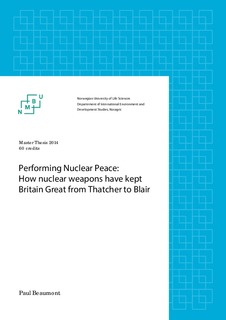| dc.description.abstract | The question of why states maintain nuclear weapons typically receives short shrift: it’s security, silly. The international is a perilous place, and nuclear weapons represent the ultimate self-help device. Other ‘factors’ like status and domestic interests provide the background music. This thesis seeks to unsettle this complacency by drawing on Foucault to reconceptualise nuclear weapon-armed states as nuclear regimes of truth, refocusing on the processes through which governments produce and maintain country-specific discourses that enable their continued possession of nuclear weapons. Building on Derrida’s observation that nuclear weapons are a “fabulously textual” phenomenon, this thesis argues that because nuclear weapons are represented to work by not being used (deterrence) their utility depends on hypotheticals, and therefore remains transcendental. Consequently, maintaining a nuclear regime of truth requires considerable discursive imagination and labour to constitute the benefits of possessing nuclear weapons—whether that be status, security or both at the same time. To investigate these nuclear regimes of truth, this thesis critiques and modifies Lene Hansen’s Foreign Policy/Identity Nexus: developing a more flexible Weberian conception of legitimacy, theorizing how Hansen’s degrees of otherness can illuminate status seeking, borrowing from nukespeak and Lakoff to theorize policy representations, and adding desirability to the goal of policy makers. Using the UK nuclear weapons policy between 1980 and 2010 as an exploratory case study, this thesis provides practical insights beyond the grasp of conventional approaches to nuclear weapons research. From how Thatcher’s reification of the nuclear peace correlation contributes to a 21st disarmament-taboo in UK politics, to how the end of the Cold War saw the UK replace its Security legitimacy with a new Non-Proliferation Treaty-based Prefect legitimacy that divests ethical responsibility for the world’s nuclear weapons problem through the performance of a counting bombs narrative, this thesis historicizes and deconstructs the many moving parts of the UK’s 21st century nuclear common sense. Ultimately, this thesis provides the theoretical legwork for future empirical investigations into other nuclear regimes of truth. | nb_NO |

